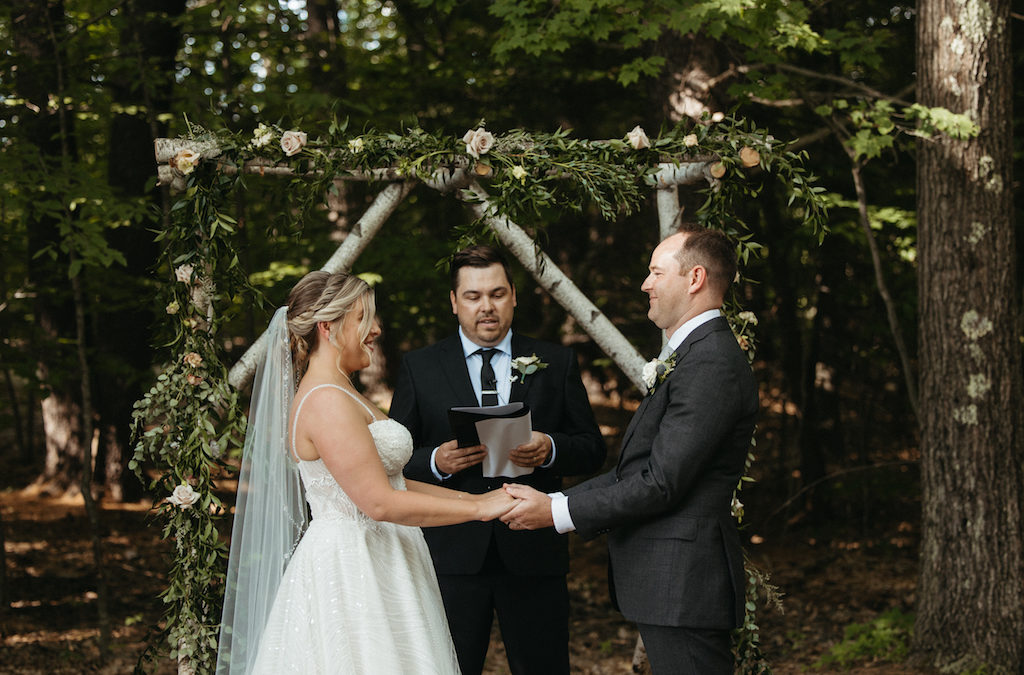
by Cassandra Stern | Jul 12, 2023 | Weddings
What is a timeline? A timeline is a list of activities and events that will take place on your wedding day. Timelines look different for different vendors, but they all serve the same purpose, which is the master guideline for the big day. That being said, it’s important to work with your wedding vendors to create a cohesive timeline that allows for a smooth and even flow of events. Follow the tips below for a timeline that functions and flows.
Keep Your Vendors Informed
Wedding vendors are commonly booked months (or even years) in advance. This means that many times, general timing is estimated, but not yet confirmed. If down the road, your ceremony or another part of your wedding timing changes, don’t forget to inform your vendors! This way, they can arrive with plenty of time to properly support you on your big day.
Cap the Speeches
Once your timeline is created, you will want to do your best to keep it running as smoothly as possible. One of the most common things that can derail a timeline is a speech (or 3!) that runs too long. If you want to keep your timeline tight, ask your friends and family members to keep their speeches to under 3 to 5 minutes and this will ensure that there’s time left for other important things.
Leave Enough Time for Formalities
If you don’t think your DJ or band can introduce you, your new spouse, and the 15 members of your wedding party in 5 minutes, you’re probably right! Don’t forget to allocate an appropriate amount of time to execute all of your formalities, such as your first dance, parent dances, cake cutting, bouquet and garter tosses, etc. If you’re not sure how long something may take, ask your trusted vendors for help!
Stay Flexible
Ask any wedding professional and they’ll tell you that no timeline is ever followed to a T. The groom may be late to the venue, or the maid of honor is in the bathroom when it’s time for introductions. Be aware that things may change and shift on the day of and take solace in the fact that your wedding vendors are professionals, who know how to handle these shifts. This keeps stress levels low and makes the day feel even more joyful!
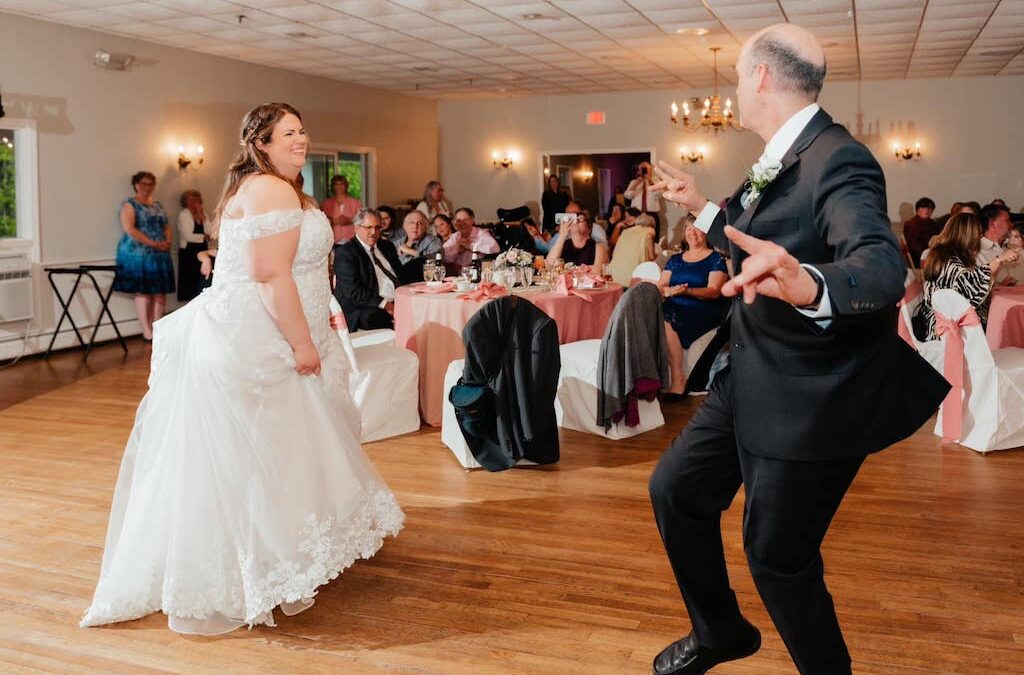
by Cassandra Stern | Jun 22, 2023 | DJs, Weddings
Band or DJ? It may seem like one of the hardest decisions to make during your wedding planning process. However, the decision may be easier than you think! If you’re currently planning your wedding and are struggling to determine whether a band or a DJ is a better fit, you’re in the right place! Try taking the following things into consideration and you’ll have your decision made in no time.
Your Entertainment Budget
One of the biggest considerations when deciding between a DJ or a band is your budget. In fact, at times it’s the only consideration needed to make your final decision. Pricing for a professional and experienced wedding DJ will generally range anywhere from $1,500 to $3,000 depending on your package of choice. A professional and experienced wedding band, on the other hand, generally comes with a much higher price tag, ranging from roughly $8,000 to $15,000. If your entertainment budget is smaller, a DJ may be your best bet.
Your Wedding Venue
Before you can bring in any kind of entertainment, you need to be sure it’s not only permitted by your venue but that there are also no other restrictions or limitations to consider. Most wedding bands feature between 5 and 11 members. Does your venue have adequate space to host live music? What about their access to electricity? It’s best to allow the band access to their own source of electricity or circuit (and not one that is shared with other vendors). Otherwise, you risk blowing a fuse in the middle of your festivities!
Your Formalities
When you imagine your first dance, your father/daughter dance, and your mother/son dance, do you imagine you’re dancing to the original versions of your song selections? If you’re very partial to the original artist’s vocals or a very specific version of your song, hiring a DJ will certainly allow for that version of the song to be played. A band can get fairly close, but remember that the vocals and even the instruments featured may slightly differ from what you’re used to hearing.
Your Town or City’s Noise Ordinance
This is one very commonly overlooked consideration. Where are you getting married? Are you in a large and bustling city or a smaller rural town? In either case, it’s always a good idea to check into any town or city noise ordinances. If there are rules regarding amplified live music after a certain hour, you may want to consider how that will affect the entertainment during the latter part of your reception.
Your Song & Genre Selections
Another thing to think about is the kind of music you’d like to hear on your big day. Are they mostly recognizable and popular songs or do you have a more genre-specific request? Although wedding bands generally perform a wide variety of songs and genres, their song lists can be limited when compared to a DJ’s. Musicians will need to take time to learn specific songs, whereas DJs can generally access them via a quick download.
Interactivity
There is no doubt that both a DJ and a band can bring a high level of energy and excitement to your wedding. However, it’s been said many times that there is nothing that brings greater energy than a live band (especially one with a great horn section)! If you’re looking for an absolutely unforgettable, interactive, and exhilarating night, you might want to consider spending a little extra for the live music.
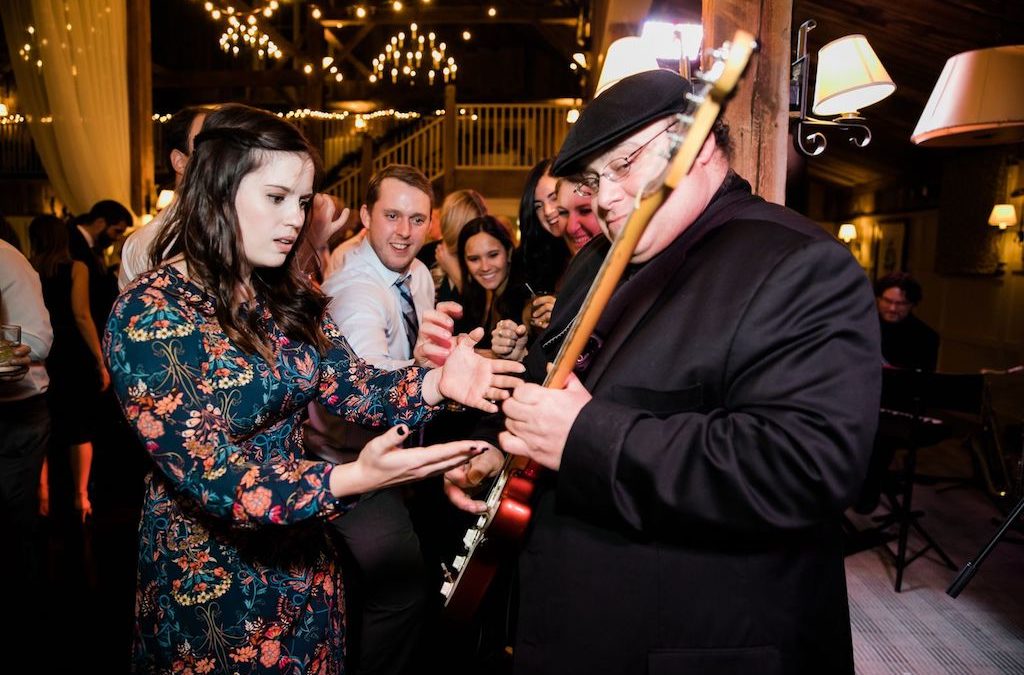
by Cassandra Stern | May 6, 2023 | Events, Weddings
How do you determine the importance of music? How does a person correctly determine its value when music has become such a steadfast and common part of our lives? Imagine for a moment that you’re at a wedding ceremony. The bride appears, looking more beautiful than she’s ever looked in her entire life. She’s dressed in her wedding gown with her gorgeous hair cascading down her back and her make-up just right. She’s got her bouquet of flowers in her hands and she’s ready to take the first step down the aisle, a step that will mark the journey toward her future. At this point, the music starts. The beautiful sounds of string instruments like violin, viola, and cello float through the air. You see the bride’s parents tear up as they experience this special day, a day for which they’ve waited so long. And you? Well, you can’t help but smile and feel immense happiness as you watch that beautiful bride walk down the aisle toward the love of her life.
How about a graduation? Imagine your child or your closest family member on their graduation day. Maybe it’s taken them a little longer to graduate than usual. Maybe they’ve needed to juggle a job, their family, or other parts of their life that have made it nearly impossible to finally earn that degree. That’s all in the past now. Today, all of their hard work is recognized and they’ll get the long-awaited opportunity to walk across that stage and feel that all of their hard work has paid off. You hear their name called as the band begins to play “Pomp and Circumstance” and you cry as they hold up their diploma to the crowd, beaming with pride and feeling more accomplished than ever.
These two life-changing events have something in common. Music. In fact, it’s one of the biggest components of both. Now imagine the same scenarios, but this time both events have no music. The bride walks down the aisle in silence and the graduate receives their diploma without the recognizable “Pomp and Circumstance” playing over the loudspeaker. It’s an odd thought, huh? Even stranger, imagine the wedding reception or cocktail hour without music. Imagine a fashion show without music. Models would walk the runway in dead silence and the whole world would just be a different place.
This is a good way to begin to recognize the importance of music. However, noticing how different and strange the world would be without music is only the first step in recognizing its value. Music is one of the best and most effective ways of evoking emotion. So, it’s no wonder that millions of people seek to find the right musician(s) for their big life events! Next time you’re hosting an important event, don’t forget to consider the importance of music’s role and reach out to a professional like Bright Set Entertainment if you need any help with selecting the right musician(s).
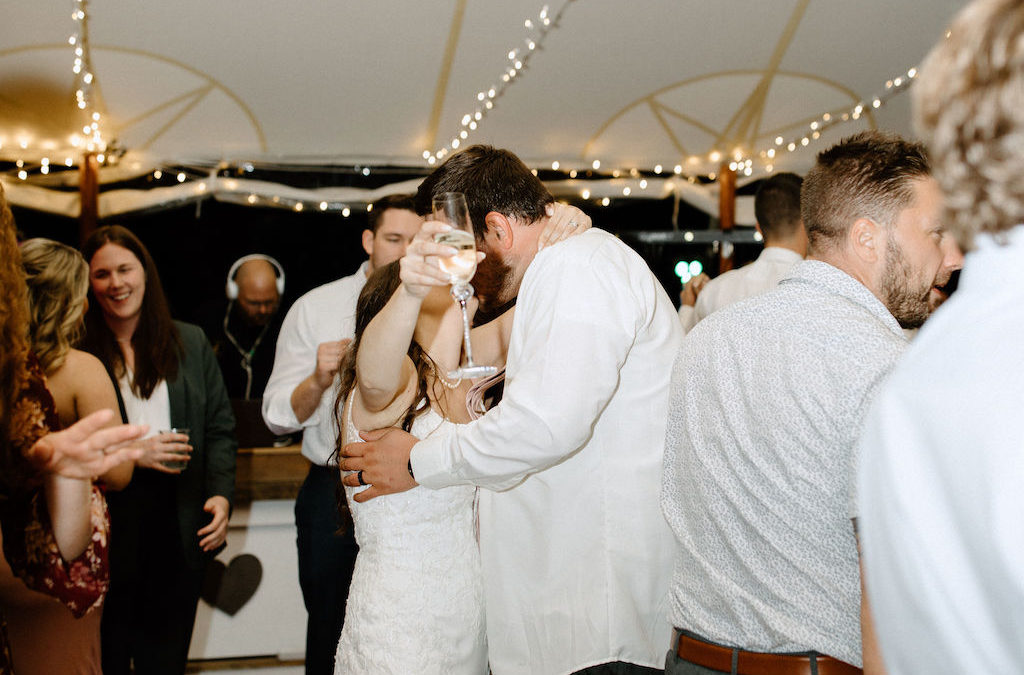
by Cassandra Stern | Apr 8, 2023 | Weddings
Let’s face it. Planning a wedding can be challenging. Before you can enjoy the fruits of your labor, there are a lot of decisions to be made. When our couples reach out to us, many of them pose the same questions about how to successfully budget for entertainment.
With many options, ranging from string ensembles and wedding bands to DJs and photo booths, there’s certainly a wide range when it comes to pricing. To make things even more confusing, the answer to each question posed can differ for each couple. Fortunately, there are things you can do to help provide yourself with some valuable insight. One of the more important tasks is setting an overall wedding budget. Once you’ve done this, you can break it down even further by splitting the budget into different categories.
Determining what you need for your wedding will help you determine your categories. Below, you’ll find the ones that are most common. Keep in mind, that yours may differ. However, it’s easiest to start with a general idea of what you think you’ll need and then revise your list as you gather more information. Here is a good place to start:
- Venue (room rental fees, chairs, tables, linens, staff, etc.)
- Entertainment (live music, DJs, photo booths, etc.)
- Photography/Videography
- Decor (centerpieces, flowers, lighting, etc.)
- Catering
- Alcohol/Beverages
You can choose to allocate funds in two different ways. You can designate a specific dollar amount for each category or you can designate a specific percentage of your budget. Designating a dollar amount is easiest when you have quotes from prospective vendors. If you don’t have them yet, that’s okay! Estimating that you don’t want to spend more than, say…a quarter of your budget on catering can still help you determine a tentative dollar amount.
Let’s say your entire wedding budget is $30,000. Think about which categories are most important to you and organize your list from most to least important. Let’s say this is what you’ve decided:
- Venue
- Catering
- Entertainment
- Photography/Videography
- Decor
- Alcohol/Beverages
Now you’re ready to break it down into percentages. Perhaps your list looks a little like this:
- Venue – 30%
- Catering – 25%
- Entertainment – 20%
- Photography/Videography – 10%
- Decor – 10%
- Alcohol/Beverages – 5%
Again, this doesn’t have to be perfect! If you don’t yet have vendor quotes, you’re bound to need to make adjustments. Just don’t let it keep you from moving forward. Remember that this exercise is meant to be a starting point for those who are seeking a bit of guidance. You can always add or remove categories and make additional changes.
Now that you know your budget and how much of it you’d like to spend on each category, you can convert your percentages into dollar amounts.
- Venue – $9,000.00
- Catering – $7,500.00
- Entertainment – $6,000.00
- Photography/Videography – $3,000
- Decor – $3,000.00
- Alcohol/Beverages – $1,500.00
And just like that, you now have an estimated budget for each category of your wedding and you’re ready to look for vendors that are within or close to your desired price range! Even better, if you notice that you’ve got more money than needed in certain categories, you can move the extra funds into different categories where they may be more useful. We’d also strongly recommend allocating funds to a “miscellaneous” category. This way, you can account for unexpected expenses that are likely to pop up.
Hopefully, this is a helpful starting point when it comes to budgeting. The biggest thing to remember is not to let it overwhelm you. Yes, there are a lot of decisions to be made, but breaking things down will always help. You’ll find the rest will flow more easily and you’ll be enjoying the fruits of your labor in no time!
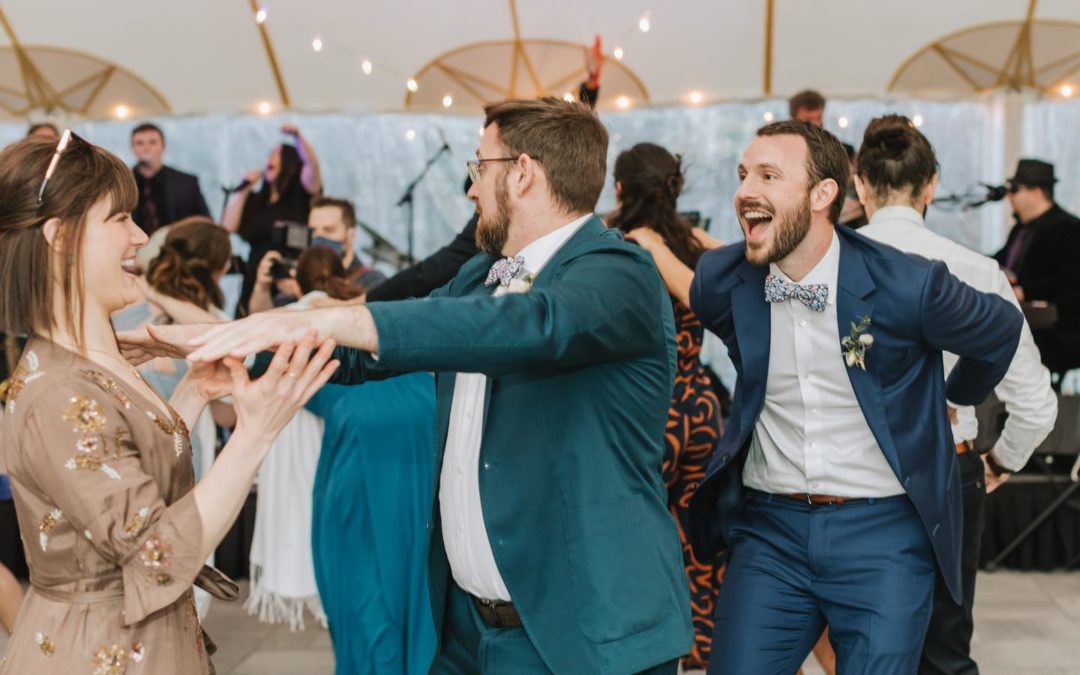
by Cassandra Stern | Mar 13, 2023 | Events, Weddings
Picture this…it’s finally your wedding day, a day that you’ve been planning and organizing for almost a year. You’re filled with emotion – happiness, joy, nerves, but most importantly, excitement! You’re ready to marry the love of your life and party like you’ve never partied before! So, how will you create and maintain that epic party atmosphere and leave your guests with memories that will last a lifetime? The answer is to keep your dance floor packed!
Keeping your guests on the dance floor doesn’t have to be challenging. Here are 10 tips and tricks that are sure to keep almost anyone dancing the night away!
Make Sure Your Band or DJ Knows How to Read a Crowd
Any seasoned wedding professional not only knows how to read a crowd but also knows when to start. Contrary to popular belief, crowd-reading doesn’t begin when your guests hit the dance floor. It starts as early as cocktail hour or dinner. This is where your DJ or band gets an opportunity to test certain songs or genres, which allows them to gauge what makes your guests tap their feet or nod their heads. This is information that can then be translated onto the dance floor later in the evening.
Ask Your Guests What They’d Like to Hear
It’s no secret that your guests will want to dance to songs they love! Don’t be afraid to ask around as you’re planning your wedding and relay the most requested songs, artists, and genres of music to your band or DJ. This way, they can incorporate the music that you know your guests will want to hear.
Dim the Lights
Not everyone is confident in their dancing skills, so it’s never a bad idea to bring the lights down a bit. Not only will this help encourage those guests who aren’t as confident as others, but it will also set the tone for dancing and allow your band or DJ to better incorporate stage and/or dance floor lighting into their performance.
Finish Your Formalities First
The best way to keep your guests on the dance floor? Don’t ask them to leave! Once the dance floor opens, it’s best not to interrupt the party with formalities, such as speeches, toasts, cutting the cake, or parent dances. This interruption can be too abrupt and harsh, which can leave your guests feeling ready to move off of the dance floor.
Start with the Right Song
The song that opens the dance floor can be make or break! Keep in mind that it doesn’t need to be your favorite dance tune! Rather, it should be a very popular and recognizable song for the biggest portion of your guest demographic. The more recognizable the song, the more likely your guests are to dance.
Encourage Your Guests
Remember, your guests are there to celebrate YOU! That means that you may have more influence than you’d imagine. Don’t be afraid to let them know that you’d love to dance with them, even beckon them onto the dance floor. Once they start dancing, they’ll be much more likely to continue.
Share Your Music Preferences, but Allow for Some Wiggle Room
Many couples make the mistake of thinking that their wedding means their music. Of course, you’ll want to incorporate your own favorite songs and genres into your big day, but don’t forget that you’re trying to keep your guests on the dance floor, too! Remember to cater to some of their favorite artists and genres, and you’ll be much more likely to keep them all dancing.
Limit the Slow Songs
Slow songs definitely have their place, but if you’re looking to keep a party atmosphere, they should be used sparingly or with purpose. For instance, if certain guests are more comfortable with slow dances, slower songs can be used to bring your guests to the dance floor. Once the slow song ends, a seasoned wedding entertainer will know how to keep those guests from heading back to their seats.
Get Yourself on the Dance Floor!
Oftentimes, your guests will look to you for guidance during your wedding or event. After all, you are the reason they came! If you’re on the dance floor, your guests may naturally gravitate toward doing the same in an effort to spend time with you and make you feel celebrated.
Schedule Band or DJ Breaks Appropriately
If your band or DJ is experienced, they will know how to appropriately schedule their break(s) to fall during slower periods of the evening, such as during dinner. This will ensure that there are no breaks during high-energy moments, like dance sets, which will allow them to keep their focus on packing your dance floor.






 Bright Set Entertainment is a a full service entertainment agency, providing live music, DJs, photo booth rentals, and uplighting services for all types of events in the New England area and beyond.
Bright Set Entertainment is a a full service entertainment agency, providing live music, DJs, photo booth rentals, and uplighting services for all types of events in the New England area and beyond.